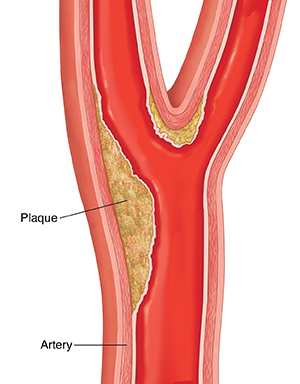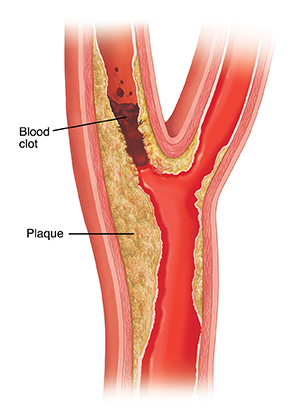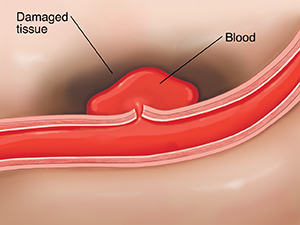Each day that your blood pressure is too high, your chances of having a stroke are increased. Normal blood pressure is less than 120/80 millimeters of mercury (mmHg). This means systolic of less than 120 mmHg and diastolic of less than 80 mmHg. A stroke is a loss of brain function caused by a sudden lack of blood to part of the brain. Stroke can be caused by the damage that ongoing high blood pressure causes in your vessels. If the affected vessel stops supplying blood to the brain, a stroke happens.
How high blood pressure damages blood vessels
Vessels thicken
When blood presses against a vessel wall with too much force, muscles in the wall lose their ability to stretch. This causes the wall to thicken, which narrows the vessel passage and reduces blood flow.
Clots form
When blood pressure is too high, it can damage blood vessel walls and create scar tissue. Fat and cholesterol (plaque) collect in the damaged spots. Blood cells stick to the plaque, forming a mass called a clot. A clot can block blood flow in the vessel.
Vessels break
Sometimes, blood flows with enough force to weaken a vessel wall. If the vessel is small or damaged, the wall can break. When this happens, blood leaks into nearby tissue and kills cells. Other cells may die because blood cannot reach them.
Know the symptoms of stroke
During a stroke, blood supply to the brain is suddenly cut off. But with fast medical help, a better recovery is more likely. Don’t wait. Call 911 if you have any of these:
-
Sudden weakness or numbness on one side of the face or body, including a leg or an arm
-
Sudden trouble seeing with one or both eyes
-
Sudden double vision
-
Sudden trouble talking, such as slurred speech
-
Sudden severe headache
-
Sudden problems using or understanding words
-
Sudden confusion
-
Sudden dizziness or loss of balance
-
Seizures for the first time
-
Any of these symptoms that happen and then go away





